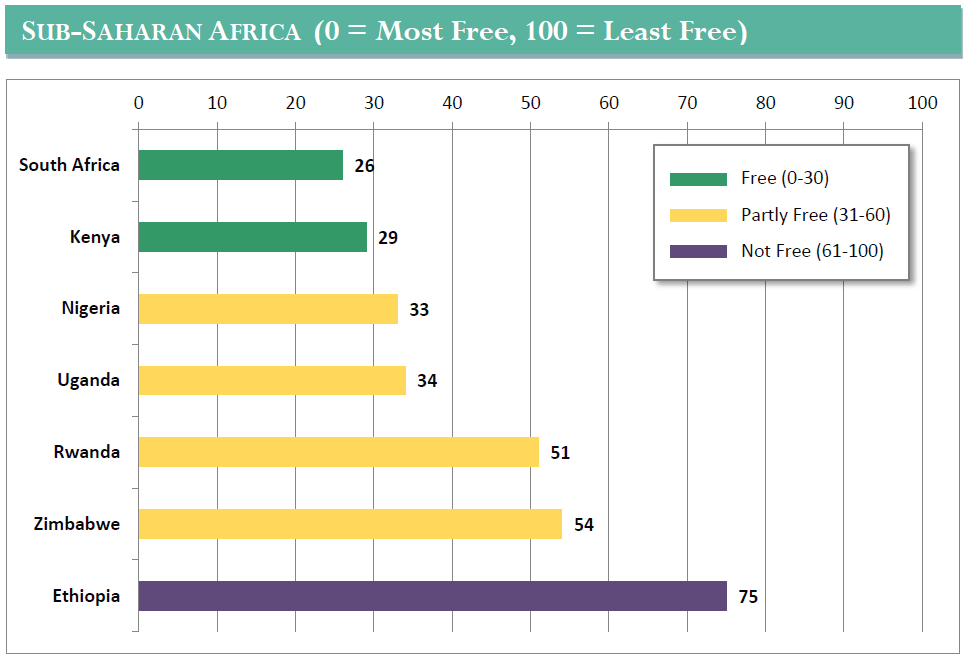‘Freedom on the Net 2012’ report finds mixed results for Africa
Freedom on the Net 2012 identifies key trends in internet freedom in 47 countries, evaluates each country based on barriers to access, limits on content, and violations of user rights. The study, published by Freedom House, finds that many governments are now using more sophisticated means to disrupt online communication than they were prior to 2011. After all, governments have learned that a blatant Internet blackout only causes international backlash and further domestic dissent. Main challenges to a free Internet include the arrest of bloggers (reported in 26 of 47 nations), attacks against government critics, the hijacking of online forums by paid commentators, and increased government surveillance. Twenty nations experienced an increase in online censorship since January 2011. Fourteen made gains toward greater freedom.
Within Africa, South Africa and Kenya are considered to be ‘free’. In descending order of freedom, Nigeria, Uganda, Libya, Tunisia, Rwanda, Zimbabwe, and Egypt fall in the ‘partly free’ region. Only Ethiopia is considered ‘not free’ (although Egypt is on the threshold).

Net Freedom scores for Sub-Saharan Africa. Ethiopia is an outlier. Click to enlarge. {Freedom House, 28}
Declines
Ethiopia’s Internet freedom score has declined the most since early 2011, followed by Egypt and then Rwanda. Ethiopia’s government blocks most politically relevant websites. Egypt employs less traceable tactics and still is known to arrest individuals who are critical of the government. Zimbabwe does this too. Furthermore, Chinese companies have reportedly worked with the Ethiopians, Libyan, and Zimbabwean governments to install the technology necessary to censor regime opponents.
Improvements
Tunisia’s score has increased the most of any nation since removing the shackles of complete Internet censorship in 2011. Kenya and Nigeria also saw greater Internet freedom (although Kenya continues to arrest bloggers).
“At risk” for further declines in Internet freedom
Libya:
- much more open online environment after the rebel victory in October 2011
- weak legal framework still poses a challenge to long-term Internet freedom
- violence in response to a YouTube video in September 2012 illustrate the pitfalls for Internet freedom in the country
Rwanda:
- strict government rule has led to great economic progress, but control over digital media is increasing
- government requests to delete political content have been reported
- upcoming legislation, if passed, could allow surveillance of e-mail communications
Country reports
Egypt:
- substantial increase in violations of user rights
- slight decrease in limits on content
Ethiopia:
- limits on content pose greatest limitation
- violations of user rights has increased
Kenya:
- decrease in obstacles to access
- very low limits on content
- violations of user rights as increased slightly
Nigeria:
- slight limitations across the board
- violations of user rights has remained steady
South Africa:
- few obstacles to access
- few limits on content
- violations of user rights unchanged
Tunisia:
- obstacles to Internet access and limits on content have plummeted
- violations of user rights have declined but are still elevated
Uganda:
- not evaluated in 2011
- main criticism is UCC direction to block Facebook and Twitter access during Arab Spring protests
Zimbabwe:
- very stable across the board
- violations of user rights is still elevated
Visit the official site for an overview, summary of findings, detailed country reports, maps, and more.
Further reading
Another great source is the annual “Enemies of the Internet” report from Reporters Without Borders (RSF). Their 2012 report placed Egypt, Tunisia, and Eritrea in the lesser “under surveillance” category. Also, freedom of expression advocate Courtney Radsch has published a copy of her remarks on the state of internet freedom in Africa from a panel session on censorship vs. freedom of expression, assembly, and association.












 Twitter
Twitter Facebook
Facebook Pinterest
Pinterest